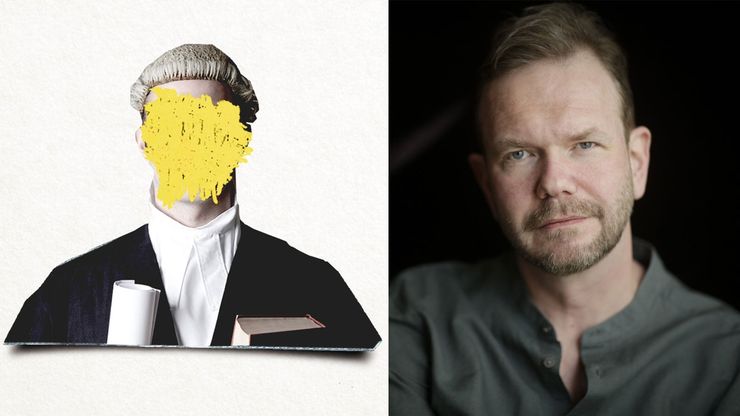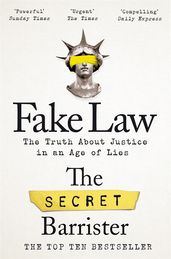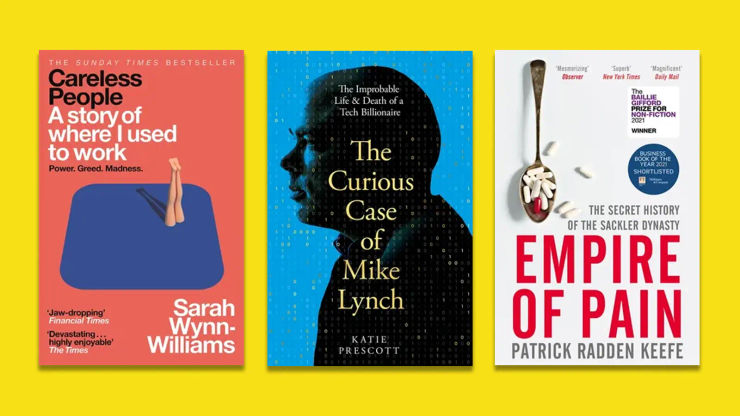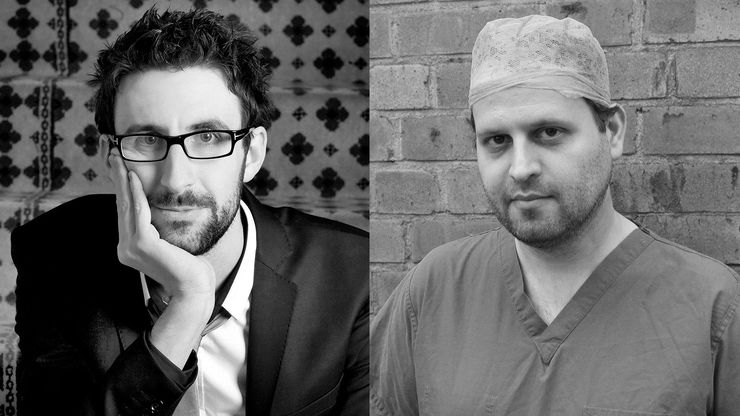The Secret Barrister in conversation with James O’Brien
The Secret Barrister discusses their new book Fake Law, the most damaging legal myths and the origins of the word ‘schmohawk’ with LBC’s James O’Brien.

The Secret Barrister is a junior barrister specialising in criminal law, who first came to the public’s attention with the award-winning blog of the same name. They are also the author of the new book Fake Law: The Truth About Justice in an Age of Lies, which aims to debunk the lies and build a defence against the abuse of our law.
Here, the Secret Barrister speaks to LBC’s James O’Brien about Fake Law, the gravest threats to our justice system and why we should view legal aid in the same way as we do universal healthcare. How Not To Be Wrong: The Art of Changing Your Mind by James O'Brien is also available now.
JO’B: Nice to see you, SB. It’s fair to say that your last book was an astounding success. Does it frustrate you that your anonymity prevents you from harvesting all the praise & plaudits in person?
SB: Thanks James! Great to see (sort of) you too. That is a lovely question in many ways, not least because it presupposes that if my identity were known I would be harvesting plaudits, as opposed to (more realistically) a sense of massive anticlimax and disappointment. But accepting the premise, I think anonymity is best for me. As I’m often told by my beloved, I am insufferable enough without the ego trip that any sort of personal acclaim might bring.
JO’B: Ha! If we see your last book as sounding the alarm about the state of the judicial system, how would you summarise the purpose of the new one?
SB: I’d say it’s sounding the alarm about our understanding of justice – the stories we are told by those in power, the distortions that we are invited to accept as truth and the motives behind those narratives.
JO’B: It struck me that many of the people/institutions you identify as presenting the gravest threats would be pretty high on my hit list too, although I am distinctly non-legal. From Farage to Dacre to Leave.EU to The Sun etc, could we identify things they have in common? Is it simply a self-serving assault on expertise?
SB: That’s certainly a large part of it, but I think in many instances the problem is more nuanced. On the one hand, you have your intrinsic bad-faith actors, who will willingly lie about anything in the service of their own careers and promotion of their own agendas, and for whom law is just another subject about which they will merrily bullshit those listening. But a lot of what we see with the way that legal stories are discussed in the news is born not so much of bad faith, but of chronic lack of understanding of the subject area. Many problems start with somebody misunderstanding, say, a court decision, and reporting it as representing something that it doesn’t, and there is then a chain of communication where at each stage the person receiving the information isn’t equipped to scrutinise it. We don’t educate ourselves, or our children, about the justice system in a way that prepares us to meaningfully engage in discussions about it. And that makes us particularly vulnerable both to the well-meaning but misguided, and to the deliberately mendacious.
JO’B: The prioritisation of feelings over facts plays a huge part too. I was particularly struck by your descriptions of the Charlie Gard & Alfie Evans cases, where millions of perfectly decent & well-meaning people fell into traps that you describe in painstaking detail. How hopeful are you of providing a ladder with which people can climb out of these traps?
SB: I am hopeful, although probably wouldn’t go so far as to say ‘optimistic’. It’s a numbers game, and my voice – and the voices of others fighting back against the misinformation – is up against politicians and news organisations with the power to speak instantly to millions, if not billions, of people. But we have to start somewhere. And where I do allow myself some cautious optimism is that social media, although by no means a leveller, does give a platform to instantly respond to nonsense being peddled, and to push out a counternarrative. This gives us a chance that we wouldn’t have had 10 or 15 years ago. So if I can reach some people by Twitter, and hook them into the book, there’s a chance, I hope, of at least bolstering the proportion of truth to falsity out there in the world.
JO’B: Which myth would you most like to strike from the public space? (You are allowed more than one if it’s too hard!)
SB: It is too hard! But I’ll try. My instinct, because it’s a cause very close to my heart, would be to strike the myths surrounding legal aid – namely the idea that we as a nation squander billions on undeserving, scum-of-the-earth criminals and immigrants and that our society would be all the better if we could simply take it away from people like, to take the Prime Minister’s recent suggestion, Shamima Begum. There’s this hardened belief, which has been fuelled for decades by politicians and the tabloids, that legal aid is for Other People. Rather than something which is essential to upholding our legal system and our democracy. We all (in this country at least) instinctively understand the value of universal healthcare. Even if you are fit and healthy now, you understand that one day you might not be, or someone you love might not be, and that having that social insurance in place is good for you. But more than that, we understand that it is a hallmark of a civilised society that we don’t let people go untreated for lack of money. Yet we struggle to apply the same mindset to legal aid. It doesn’t occur to us that if legal aid is removed from one set of people the government doesn’t like, it might one day be removed from people like us. It doesn’t occur that, in a civilised society, even the worst among us deserve to be treated according to our democratically-made laws. If I ever discover the key to helping rehabilitate legal aid in the eyes of the wider public, I will retire happy. Poor, but happy.
JO’B: You could say the same about ‘Human’ Rights. In fact, you pretty much do. The failure to grasp that they protect all ‘humans’ clearly frustrates you enormously. How worried are you about post-Brexit dilutions of the HR Act? The Home Secretary boasted last week that her planned immigration laws would ‘send the left into meltdown’, for example.
SB: I am hugely worried. Cummings blogged a couple of years ago about how, once Brexit was done, he would extricate the UK from the European Convention on Human Rights (and hence the Human Rights Act), and there is not a single voice in the current government with the intelligence or fortitude to speak up for the value of human rights. The fact that our Home Secretary sees human lives – real, breathing people fleeing war zones and swept up on our beaches – as targets on which to score political points against ‘the left’ is pure Trump. A few years ago, abolishing the Human RIghts Act – which David Cameron was promising to do before he was elected – was bonkers, but dressed up as an act of taking back control etc. Bonkers, but at least you could understand the human impulse. Now we are governed by people whose motivating principle is ‘owning the libs’, and who will merrily uproot the cornerstones of our democracy simply to get a rise out of the other side. It’s government by Twitter troll. So yeah, I’m pretty terrified. The only consolation, as David Allen Green wisely points out, is that for all the tough talk, this is an administration utterly incapable of getting anything done. Cummings is a man whose sole accomplishment in life was realising that if you put enough racist posters on Facebook, you can terrify people into believing the lies you tell. Johnson is still waiting for his first accomplishment. His Cabinet, even pooling their intelligence, could not spell ‘accomplishment’. So that’s the hope. That’s the sole glimmer of light. That the stupidity of our leaders outweighs their malevolence.
JO’B: Yikes. To step away from the left/right dichotomy, Labour politicians have also expressed unhappiness with judicial independence. You remind us of examples involving David Blunkett. But there seems to be something more sinister in the air at the moment. I was particularly struck by the revelation that the Lord Chief Justice sought security advice in the aftermath of the Enemies of the People headline in the Daily Mail. I would, however, say that the peak of judge-baiting had passed with the ‘achievement’ of Brexit. Am I being naive?
SB: I would never accuse you of naivety. But yes. Possibly. A little. It’s an important point, first of all, that you raise about the cross-party nature of Fake Law. This is by no means the preserve of one or even two political parties; politicians across the board have been wont to attempt to undermine the judicial system, to varying degrees, when they haven’t got their way. I spend a lot of time criticising the Conservatives because they are in government, but that’s not because I think that any particular party has an unimpeachable record on this front. They don’t. And I troll them all with equal vigour. But as far as judge-baiting is concerned, it’s been a long-adored past-time of politicians for decades. It didn’t start with Brexit, although the Enemies of The People headline is perhaps the most emblematic and significant attack on judicial independence. But nor will Brexit bring it to a close. The current government was elected on a manifesto promising to reform judicial review, on the (false) prospectus that judges are becoming too “political” – by which they mean overruling unlawful executive actions. The Commission was announced the other week, chaired by Edward Faulkes, who was a junior minister under Chris Grayling in the Ministry of Justice, and who has written about his desire to restrict judges’ jurisdiction to determine cases where the government is accused of acting unlawfully. So it’s pretty clear what this ‘independent Commission’ is going to end up recommending. In the meantime, whenever a court decision goes against the government, we have the drip drip of Unnamed Downing Street Sources telling The Sun and The Telegraph how these judges need reminding who’s in charge, and I worry that, before this government is out, some serious damage could have been done to the fabric of the rule of law. Put simply, judicial review stops governments acting unlawfully. Any efforts by a government to restrict judicial review represent a significant power grab. And that should scare us whatever our political leanings.
JO’B: You are clearly motivated by a belief that people would not permit this if they understood the gravity of the threat. And it is ‘fake law’ that prevents them from seeing the light in many cases. I wonder whether you have any idea of what a politician like, say, Philip Davies (who pops up once or twice) would consider to be a ‘fair’ trial? He seems certain that many trials today are unfair . . .
SB: Philip Davies is a man who, on a BBC documentary, bounced up and down while sitting on an electric chair, enthusing about how that’s exactly the sort of justice we need in England and Wales, so I think it’s fair to say that he is probably part of a constituency that I’m not going to be able to persuade. And ultimately, nice as I think it would be if lots of people agreed with me, that’s not really the primary aim of the book. I’m happy for people to argue against human rights, say, or against increasing legal aid, as long as when they do so they are equipped with – and deploy – actual facts. I naturally happen to believe that if they are equipped with the facts that they will be forced to reconsider their position, but even if they don’t – as long as they aren’t parroting myths and are able to appreciate the counter-arguments, I’ll be content. Ish.
JO’B: You have a lovely turn of phrase, describing one of my colleagues as a ‘clown car of stupid’ being a particular delight. Two questions to conclude: did you invent the word ‘schmohawk’? And are you as good with the spoken word in court as you are with the written word in books? No modesty allowed.
SB: I did not invent Schmohawk – it is a Larry David-ism from Curb Your Enthusiasm. It’s something his father shouts at bad drivers. I just enjoy it as a non-sweary insult. And I think I am probably much more proficient on the page than I am in court. You can’t edit out something you’ve just blurted out to a witness or fumbled in front of a jury. If I could crack that, I’d really be onto something . . .
JO’B: Thank you, SB, for another urgent alarm bell of a book and congratulations on what is certain to be another bestseller.
SB: Thank you, and thank you so much for doing this. It is almost as much fun as seeing you in person. Almost.
And that’s a wrap! Thank you, I really appreciate you taking the time for this. And very best of luck with How Not To Be Wrong – can’t wait to read it.
Fake Law
by The Secret Barrister
Many of us think the law is only relevant to criminals, but in fact it affects every area of our lives. Being unfamiliar with the law makes us susceptible to media spin, political lies and misinformation, allowing the powerful to corrupt justice without our knowledge. In Fake Law the Secret Barrister reveals the stupidity, malice and incompetence behind some of the biggest legal stories, building a defence of our law that is both entertaining and vitally important.



